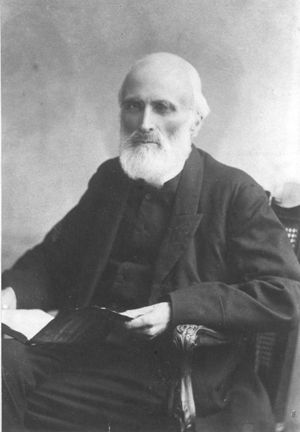Fenton John Anthony Hort
1828-92. D.D.; Botanist and  Natural Scientist. Lady Margaret’s Professor of Divinity. Co-author of the 1881 revised version of the New Testament.
Natural Scientist. Lady Margaret’s Professor of Divinity. Co-author of the 1881 revised version of the New Testament.
Hort was born in Dublin, the great-grandson of an Archbishop of Tuam, and educated at Rugby and Trinity, graduating in Moral Science and Natural Sciences as well as Classics. He became a Fellow in 1852, and soon afterward, with J.E.B. Mayor and J.B. Lightfoot, established the Journal of Classical and Sacred Philology.
In 1857 he was married, and accepted the college living of St Ippolyts, near Hitchin, Hertfordshire, where he remained for fifteen years. During his time there he took part in discussions on university reform, continued his studies, and wrote essays for various periodicals. In 1870 he was appointed a member of the Revision Committee working on a new translation of the New Testament, and in 1871 he delivered the Hulsean lectures before the university. In 1872 he accepted a fellowship and lectureship at Emmanuel College. He became Hulsean Professor of Divinity in 1878, and in 1887 Lady Margaret's Professor of Divinity. He taught in Cambridge for most of his life and became closely associated with E.W. Benson, Lightfoot and B.F. Westcott.
Hort is best known for his work in New Testament textual criticism and for proposing the theory that Codex Vaticanus and the Codex Sinaiticus (along with a few other early manuscripts) represented a text that most closely replicated the original writing. Hort called this text the Neutral Text (according to his studies, the Neutral Text described certain manuscripts containing the smallest degree of textual corruption). This is the text that Hort, together with his friend B. F. Westcott, relied upon for compiling their edition called The New Testament in the Original Greek, which took twenty-eight years to complete.
Hort, with his friends Westcott and Lightfoot, had planned to collaborate in writing a commentary on all the books of the New Testament, but they did not realize their collective goal. Lightfoot completed commentaries on some Pauline Epistles; Westcott completed his work on Hebrews, John, and the Epistles of John; but Hort did not complete any books, being instead occupied with producing the English Revised Version and was known to be a perfectionist. After his death it was discovered that he had written on James and 1 Peter. A dozen of Hort's works were published posthumously; these include Judaistic Christianity (1894), The Christian Ecclesia (1897), and his Hulsean Lectures of 1871, The Way, the Truth and the Life, which dealt with philosophical theology.
Hort's most influential work was his Introduction to The New Testament in the Original Greek (1882), in which he detailed the critical principles which he and Westcott had followed in making their edition of the Greek New Testament. Another monograph, Two Dissertations (1876), defends the reading "only God" in John 1:18, a reading that appears in the earliest Greek manuscripts.
Hort was more than a brilliant scholar: he was also an involved churchman. He was particularly interested in social issues and supported the work of E.D. Maurice and Charles Kingsley, both leaders in the British social gospel movement.
| Memorial inscription | Translation |
|
AD GLORIAM DEI ET IN MEMORIAM FENTON JOHANNIS ANTONII HORT S.T.P. EX FUND: DOM: MARGARETAE PROFESSORIS |
To the glory of God and to the memory of Fenton John Anthony Hort, D.D., Lady Margaret Professor of Divinity and sometime Fellow of the College, this brass was dedicated by his son, also a Fellow of the College. His vigorous countenance and lively eyes revealed the quick force of his mind. Unacquainted with no branch of knowledge but dedicating himself only to one, he brought to bear on the study of Theology learning drawn from every source. A hard-working, perceptive and temperate scholar, who sought the truth alone before all else and in all he did, he worked to restore the original text of the New Testament using methods of research unfamiliar at that time. He was a pure and holy man of such devotion to his friends that he did not refuse advice even to a stranger. His many friends escorted him to the grave as a token of their love, regret and reverence. He was born in Dublin on St George’s Day 1828 and died at Cambridge on St Andrew’s Day 1892. |
Fenton John Anthony HortBrass located on the north wall of the Ante-Chapel. |
Click on the thumbnail for a larger image. |
|
|
PREVIOUS BRASS |
|
NEXT BRASS A.E. Housman |
| Brasses A-B | Brasses C-G | Brasses H-K | Brasses L-P | Brasses R-S | Brasses T-W |

